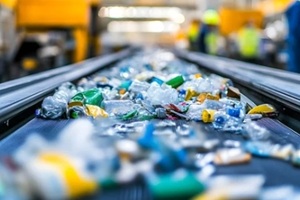April 7, 2025

As the global plastics industry faces unprecedented growth and environmental scrutiny, stakeholders are seeking to balance economic demands with ecological responsibility & plastic sustainability. As of today, plastic production is currently projected to triple by 2060, with annual output potentially exceeding 1.2 billion tons.
Rapid growth brings mounting challenges for the environment, as waste from plastic directly impacts ecosystems and strains natural resources. Addressing this issue requires bold, innovative strategies that transform how the material is produced, used, and reused.
That’s why industry leaders are actively stepping up with actionable solutions, focusing on reducing single-use plastics, adopting circular lifecycle models, and integrating low-carbon technologies. Their collective efforts help highlight a shared commitment to reshaping the future of plastics while balancing environmental stewardship with economic progress.
A circular plastics lifecycle is essential to reducing the environmental impact of growing plastic production. Designing plastics that support continuous reuse and allow for high material recovery rates can significantly limit waste in the global plastics supply chain. Collaborative systems, such as reuse, refill, and return practices, provide practical pathways to minimize single-use plastics.
Circular initiatives also deliver economic benefits by creating tangible value from waste materials while also reducing dependency on raw resources. Transitioning to this model addresses pollution and supports long-term plastic sustainability goals, benefiting industries, consumers, and the planet alike.
Automated systems and AI-driven technologies are revolutionizing waste sorting, making recycling processes faster and more precise. Innovations like these allow for the efficient separation of mixed materials, increasing the recovery of recyclable plastics while reducing contamination. Reverse logistics models play an essential role in this effort, enabling companies to track consumer packaging from collection to disposal.
Transparency at every stage helps ensure materials are properly managed and reduces the risk of plastic waste leaking into the environment. Together, these advancements create a more sustainable ecosystem and support a circular economy that benefits businesses and the planet.
Incorporating low-carbon inputs like carbon-negative e-methanol into plastic production can significantly reduce greenhouse gas emissions. E-methanol, derived from captured CO2 and renewable energy, serves as a sustainable alternative to traditional fossil-based feedstocks.

The approach lowers the carbon footprint of manufacturing while offering long-term CO2 storage within plastics. Renewable and biodegradable materials provide additional options for specific applications, addressing both environmental concerns and niche industry needs.
Studies show that such innovations have the potential to cut emissions in major sectors while advancing global plastic sustainability goals. Transitioning to low-carbon inputs is an effective way to align production practices with environmental priorities.
Collaboration remains essential for advancing a circular plastics economy. Encouraging partnerships with start-ups, global innovators, governments, and recyclers can all help drive the adoption of transformative technologies and truly scalable solutions. Multi-stakeholder efforts have enabled initiatives such as automated waste-sorting technologies and blockchain-driven material tracking to gain traction.
Addressing systemic challenges like inefficient recycling infrastructure and limited consumer engagement requires joint action. Shared efforts unlock new opportunities, from funding to streamlined regulations, accelerating progress toward sustainable plastics practices. Coordinated action amplifies the impact of individual contributions, paving the way for a more sustainable and interconnected industry.
Join our PLASTICS Pulse newsletter today to receive updates on within the plastic industry while staying informed & connected.
Data-driven technologies are transforming how the plastics industry approaches true plastic sustainability. Blockchain systems provide unparalleled transparency, enabling precise tracking of materials throughout their lifecycle and improving recycling accuracy. The technology removes inefficiencies and builds trust among stakeholders by creating tamper-proof records of material flows.
Advanced analytics further enhance these efforts, offering insights into lifecycle impacts and identifying opportunities to optimize processes. Companies leveraging these tools are significantly improving operational efficiency, reducing waste, and streamlining resource use. Utilizing data-driven insights allows businesses to align their operations with environmental and economic objectives, contributing to a smarter and greener plastics framework.
Educating consumers about recycling is an important foundational step toward achieving a circular plastics economy. Providing clear guidance on things such as the sorting and disposing of materials helps individuals make informed choices that reduce waste. Increasing accessible options, such as local disposal points and packaging redemption systems, encourage widespread participation in sustainable practices.
Strategies like these give consumers an active role in reducing plastic pollution. Aligning individual efforts with industry-wide plastic sustainability goals amplifies the impact, creating a collaborative approach to environmental responsibility. Including consumer engagement bridges the gap between innovation and everyday action, creating a shared commitment to preserving resources and protecting the planet.

Global standards hold significant potential for addressing the challenges of plastic waste and pollution. International frameworks created through treaties help enable standardized recycling and production practices, encouraging greater cross-border collaboration. Through shared policies aimed at reducing waste leakage and advancing sustainable reuse, consistent guidelines are created that benefit industries and the environment alike.
Industry leaders have a unique opportunity to shape these standards, leveraging their influence to drive impactful change. Aligning with global efforts strengthens collective action, paving the way for a unified approach to building a sustainable plastics economy.
The path to a sustainable plastics future demands innovation, collaboration, and active consumer involvement. Plastic manufacturers and industry professionals have a vital role in adopting transformative technologies, forming impactful partnerships, and empowering consumer participation.
Joining PLASTICS, the Plastics Industry Association, provides access to valuable resources, including advanced recycling programs, innovative solutions, and industry-wide support. Together, these efforts pave the way for reduced environmental damage and a thriving circular economy. It’s time to set an example and guide the plastics industry toward a greener, more responsible future.
PLASTICS and the Future Leaders in Plastics (FLiP) Committee are devoted to supporting and encouraging the next generation of plastics leaders who will play a crucial role in the innovation, technology and future of the plastics industry. FLiP’s mission is to provide young professionals under the age of 40 the exposure, education and resources they need to build lifelong careers in plastics. Want to join? Want to get your employees involved? Email: flip@plasticsindustry.org